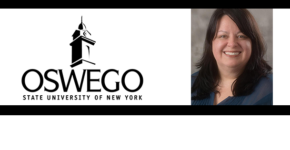 On SUNY Oswego Week: Your employment has a lot to do with your health in the U.S.
On SUNY Oswego Week: Your employment has a lot to do with your health in the U.S.
Michele Thornton, assistant professor in health services administration, examines the correlation.
Michele Thornton completed her M.B.A. in Health Sector Management at DePaul University in 2010 and her doctoral studies at the University of Illinois in Chicago – School of Public Health in Health Policy and Administration. Her research examines the role of health insurance brokers in the small employers, tracking patterns of medical and pharmaceutical tourism and most recently developing ethical decision-making frameworks for employers to employ during pandemics and teaches classes in Health Insurance & Employee Benefits, Health Economics, Health Policy and Public Health Administration.
Employment and Health
In the United States, employment and health are closely linked through the reliance on private health insurance benefits. My research focuses specifically on ethical and safe decision-making around this topic. Understanding the relationship between health and employment has risen in priority during the pandemic as many employers were forced to lay off workers or cut benefits in response to the rapidly changing economic conditions. Generally speaking I rely on core epidemiological principles, public health theory, and business ethics – and from these three areas, I’ve developed an approach that gives employers a framework to make grounded, ethical, equitable and safe decisions during pandemics. Epidemiology is the study and analysis of the distribution, patterns and determinants of health and disease. Given how much time each of us spend at work… its’ important to explore how this plays out in the workplace.
Over the past 12 months, employers had to decide when and if they could remain open, how to innovate around remote work, and what adjustments could be made to keep employees safe. Moving forward this extends to whether or not to require things like COVID-19 testing and even vaccinations. Each one of these decision points requires employers to consider the implications to the employees – both individually and collectively, their privacy and autonomy, as well as, the community interact with, and finally the overall long-term sustainability for the business. While we may be on the upside of battling COVID-19, all research points to the fact that this will not be the last infectious disease outbreak we face. The toolkit we’ve created provides employers with an actionable set of ethical decision-making criteria to examine these dilemmas to make the best overall choices for all involved stakeholders – while simultaneously balancing their accountability for helping to control or mitigate the spread of disease.


Comments
2 responses to “Michele Thornton, SUNY Oswego – Employment and Health”